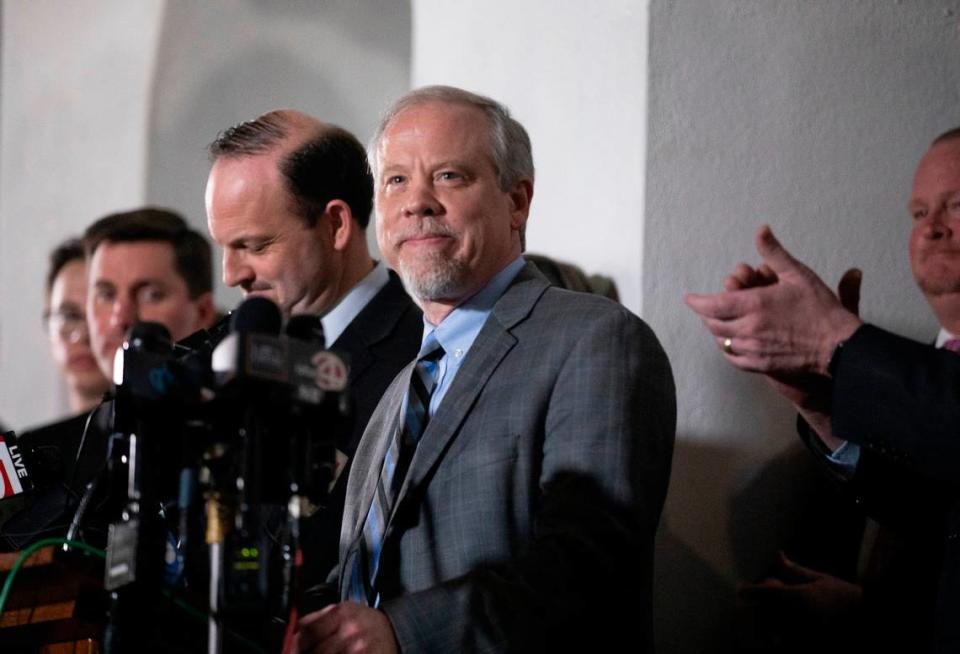‘Family annihilator’ descriptor fit Alex Murdaugh to a T, says SC prosecutor Creighton Waters
The term “family annihilator” was used only twice by South Carolina prosecutors in the six-week trial that resulted in the conviction of former attorney Alex Murdaugh in the murders of his wife and son.
But S.C. Attorney General Alan Wilson and chief prosecutor Creighton Waters said it perfectly describes a rare kind of killer, like Murdaugh.
“Obviously, one of the biggest questions somebody’s going to ask is how could a father do this to his wife and son,” Waters said in a recent sit-down interview with The State Media Co. “As we started to look around, we found there’s actually a recognized phenomenon in criminology called the ‘family annihilator.’ We ultimately reached out to a criminologist who put a term to what we had already identified, and it fit him to a T.”
Both Waters and Wilson sat in separate interviews with a State reporter to talk about what they considered strengths in the state’s case, what’s next as Murdaugh still faces dozens of financial fraud-related charges and what the future holds — for both of them — after the pair prosecuted one of the nation’s highest-profile criminal cases in years.
On March 2, a Colleton County jury took less than three hours to convict Murdaugh, 54, in the grisly shooting deaths of his wife, Maggie, 52, and youngest son, Paul, 22 on the family’s vast rural estate, called Moselle. The trial, which began Jan. 23, was livestreamed daily and watched by millions.
Murdaugh, now serving two consecutive life sentences without parole at a South Carolina prison for double murder, contends he is innocent. His attorneys, Dick Harpootlian and Jim Griffin, are appealing.
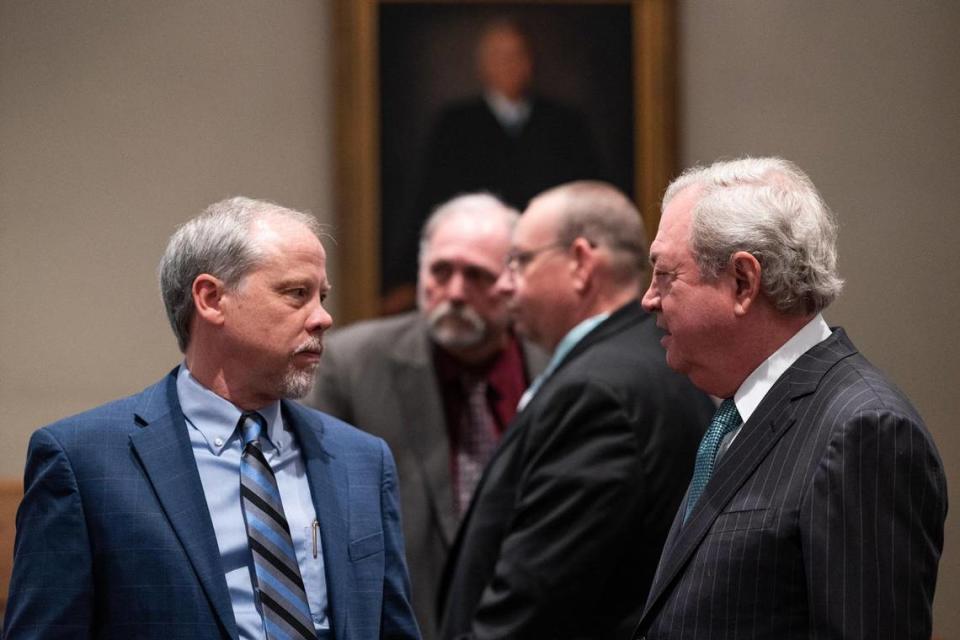
The murder trial will be talked about for years, as much for the brutality of the crime — Maggie was killed with an assault type rifle, Paul, with a shotgun — as for other elements of the case.
Murdaugh was a fourth-generation member of a powerful Lowcountry legal family regarded as above reproach. Overwhelming evidence was introduced at trial about his masterful ability to steal millions of dollars unnoticed from those closest to him, including lawyers at his law firm.
In the broad spectrum of killers, ‘family annihilator’ refers to a small bandwidth: a family person, most often a successful man, who is facing the threat of exposure of a hidden life of issues such as drug addiction, debt, criminality. In Murdaugh’s case, all those factors, which he had covered up by a lifetime of lies, were about to unravel, Waters said.
So, in response, he kills family members.
“Are you a family annihilator?” Waters asked Murdaugh during a three-hour cross-examination, without explanation.
“An annihilator? Do you mean did I shoot my wife and son? No,” Murdaugh replied. “I would never hurt Paul or Maggie — under any circumstances.”
Wilson, in his fourth term as attorney general — he was last reelected in November — said he learned about the term “family annihilator” at the trial’s start, sharing the newfound phrase with Waters and veteran co-prosecutor, Don Zelenka. He said the term fit Murdaugh “like a glove.”
“It’s a common sense thing that we had identified before we even knew there was a name for it,” Waters said.
As chief prosecutor, Waters, 52, spent months preparing for the trial, with its intertwined webs of financial and murder evidence, its 62 prosecution witnesses and 14 defense witnesses, even forgoing playing with longtime friends in his Columbia-area rock band, where he is lead guitar.
In preparing to oversee the work of a half-dozen prosecutors and hundreds of witnesses and law enforcement officials, Waters said he read a Stephen Ambrose biography of the late President Dwight Eisenhower, who as a World War II Allied general was in charge of carrying out the complex invasion of France on D-Day in 1944, Waters said.
Among his biggest worries, making sure the state’s dozens of witnesses were ready to testify when called.
“We never let court break down once,” he said.
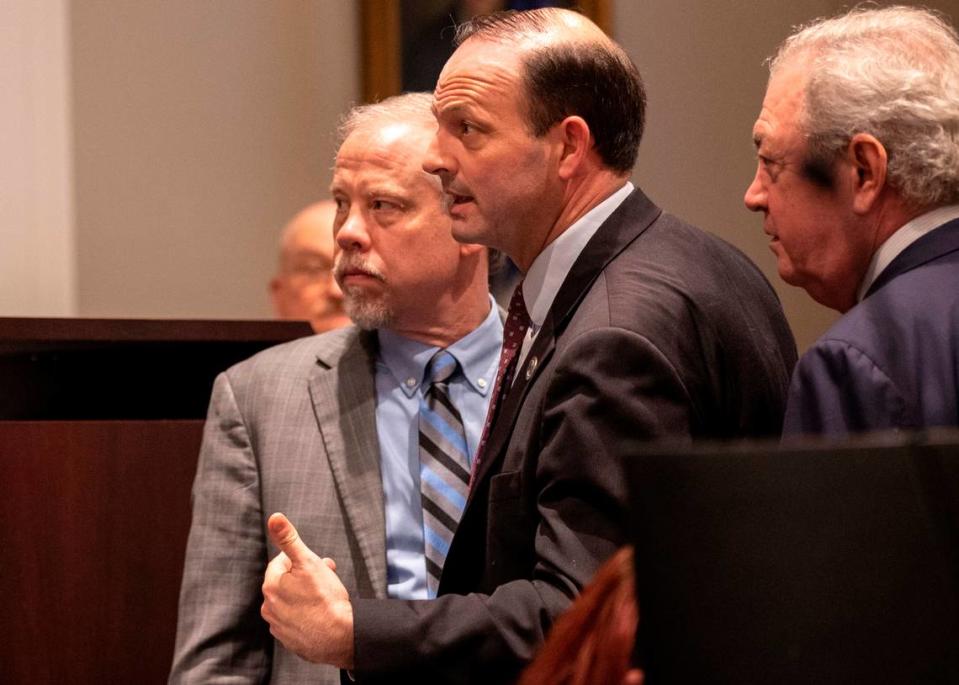
Trial evidence
There was car and cellphone data. There were spent bullet shells on the estate’s shooting range that matched shells around Maggie’s body. There was devastating testimony from Murdaugh’s friends, sister-in-law and those closest to Paul.
But the publication of a 58-second video found on Paul’s cellphone that contained the voices of Murdaugh, Paul and Maggie at the site of the killings on the property about the time their deaths occurred likely was the state’s strongest piece of evidence.
The video was only found by law enforcement 10 months after the murders June 7, 2021, when investigators finally were able to unlock Paul’s cellphone.
It was particularly compelling because it contradicted numerous false statements by Murdaugh to law officers, family members and friends that he was nowhere near the dog kennels when Paul and Maggie were killed.
It also added to one of Waters’ main theories of the case: Murdaugh lived a life of lies.
‘’Obviously the kennel video was huge. It’s hard to get around being at the scene of the crime with the victims just moments before they die and then lying about it,” Waters said. “Putting your killer at the scene when the victims die — that’s pretty good.”
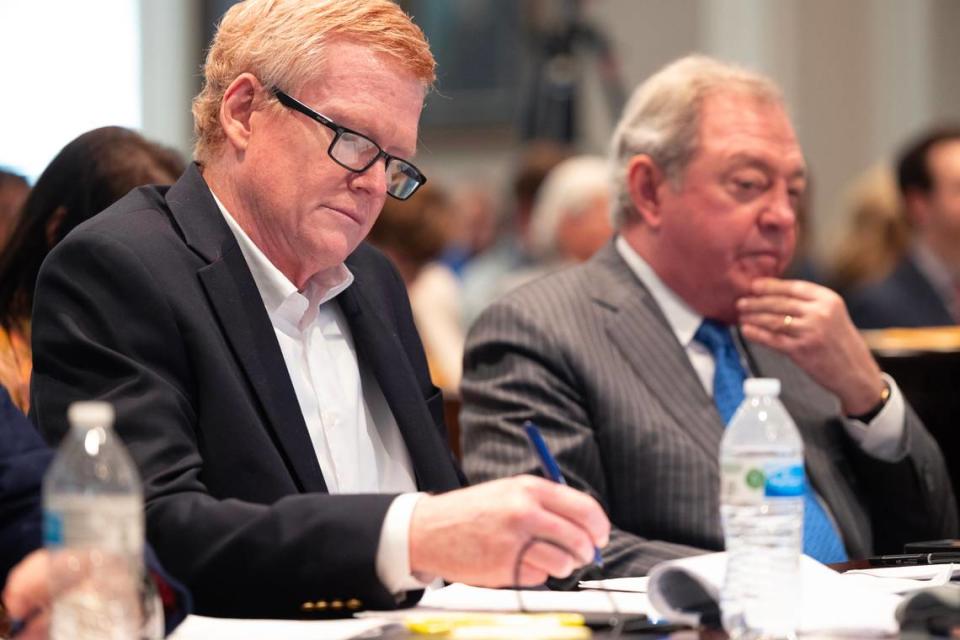
Yet despite such crucial circumstantial evidence, the absence of specific proof — such as a fingerprint from a murder weapon — that Murdaugh killed Maggie and Paul made introducing evidence showing the financial pressures on Murdaugh even more important, Waters and Wilson said.
Moreover, the murder weapons — a shotgun and assault-type rifle — were never found, allowing Murdaugh’s attorneys to claim there were possibly two shooters who actually did the killings.
With no psychological testimony allowed, Waters and his prosecution team presented approximately 10 witnesses who detailed allegations about Murdaugh’s debts and numerous embezzlements of more than $10 million from clients, friends, his law firm and even his older brother, Randy.
Witnesses told the jury that the day Murdaugh killed his wife and son, Murdaugh’s crimes and massive debts were all on the verge of being exposed.
During the trial, Waters described the threats to Murdaugh’s image as a family man and successful lawyer as a “gathering storm” — a complex interlocking series of events and investigations converging on Murdaugh right up to the killings — and that imminent exposure triggered the murders.
“I think it was necessary for the jury to understand everything that was going on in this man’s life,” Waters said. “You can’t just do part of it.”
That’s why, Waters said, he introduced evidence about the death of 19-year-old Mallory Beach, who died in a 2019 boat crash. Murdaugh owned the boat, which was piloted by an allegedly intoxicated Paul, then 19.
After the crash, a tenacious Allendale attorney, Mark Tinsley, sued Murdaugh, seeking tens of millions of dollars, money that Murdaugh didn’t have, Tinsley testified.
“I don’t think the jury would have understood what it all meant for Alex without telling the (entire financial) story in its entirety, Waters said. “It was an unbroken chain.”
All that financial data will be grist for Murdaugh’s attorneys on appeal after they argued unsuccessfully in court that such extensive testimony about financial crimes should not have been allowed because it would prejudice the jury.
The next step is prosecuting Murdaugh for those financial crimes, says Wilson, who is often asked why prosecute when Murdaugh is in prison serving two life sentences.
Murdaugh faces some 99 separate charges of money laundering, breach of trust, computer crimes, forgery, tax evasion and drug trafficking.
“The shortest answer is those victims deserve to have their case heard in a court of law, regardless of what’s happened to Alex Murdaugh,” Wilson said. “He needs to be held accountable for those crimes as well.”
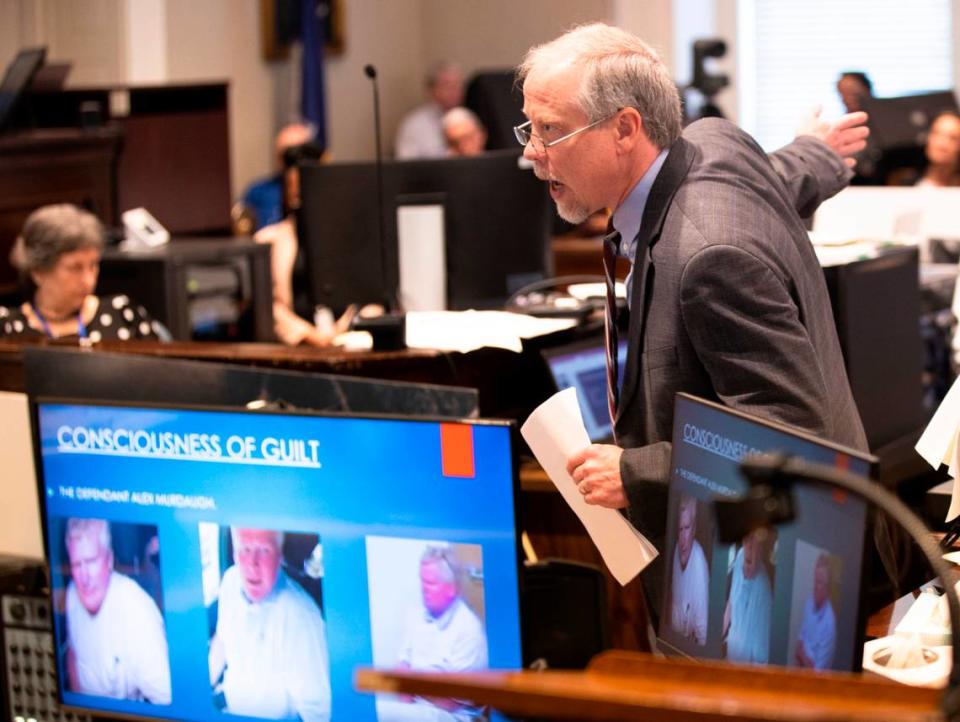
What next?
Barely a month after the trial, Wilson and Waters have faced questions about their own future: Will Waters run for attorney general once Wilson leaves office, or go into private practice earning far beyond a $130,000 government salary?
No, Waters said, he hasn’t thought about any of that.
Being the chief prosecutor of the state grand jury and the opportunity that post gives him to take on complex cases of high public interest is what matters to him, he said.
“It’s just what I love to do, and I’m not ready to hang up the cleats yet,” Waters said.
Wilson, 48, who sat at the prosecutors’ table throughout the trial and questioned the state’s last witness, said the trial had a broader significance than the crime itself.
Before the trial, Wilson said people told him that a person from the politically powerful and prominent Murdaugh family would never be convicted of such a crime in South Carolina. But the verdicts dispelled that myth, he said.
“There are no untouchables,” he said.
Wilson, who has faced his own rumors about running for higher office — he would follow the path of his father, longtime U.S. Rep. Joe Wilson, R-Springdale — contends he doesn’t know what the future holds.
“I’m staying in the present because that’s where my attention needs to be,” Wilson said. “There’s too much going on here to be thinking about two or three, four, five, six years away.”
Wilson said he has no regrets about not pursuing the death penalty against Murdaugh.
In comments made to Murdaugh right before his sentencing, Judge Clifton Newman noted that Murdaugh’s father, grandfather and great-grandfather— all three Lowcountry prosecutors — had sought the death penalty against defendants in the very courtroom in which Murdaugh was tried.
“Over the past century, your family — including you — have been prosecuting people here in this courtroom, and many have received the death penalty, probably for lesser conduct,” Newman told Murdaugh, a former volunteer prosecutor.
Wilson said a death penalty case would have been terrifically expensive, perhaps against the wishes of the Murdaugh family and the state’s death penalty law is being challenged in court, he added. And such a trial, with all the complexities the death penalty involves, could have gone on far longer than six weeks.
“We’d still be down in Colleton County,” said Wilson, whose office is still tallying the cost of the six-week trial.
In any case, Wilson said life without parole for a once-privileged man like Murdaugh “is a fate worse than death.”
